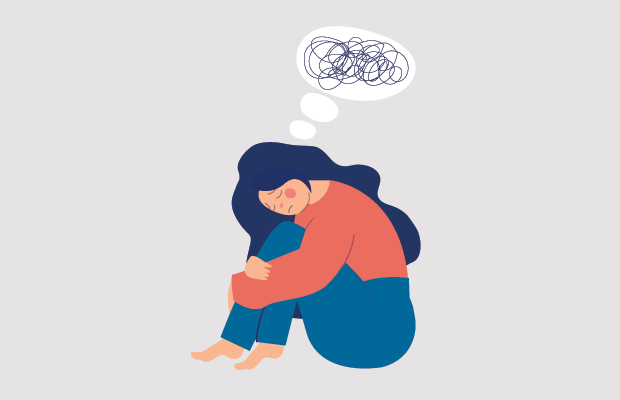Dr Venetia Leonidaki, Consultant Clinical Psychologist at Spiral Psychology, says: “Dropping habits can be really hard, and sometimes doctors are telling you the change is vital for your survival. But there are ways you can try to ease this transition, manage your anxiety, and increase your motivation.”
Dr Carla Croft, Consultant Clinical Psychologist at Barts Health NHS Trust, says: “I would never want to minimise what people are going through, but sometimes it helps to reframe it by thinking of it as making a change. As we go through life, we all make changes that will benefit our health, so thinking about it like that can help.”
Recognise and accept feelings of loss

When we give up a treasured hobby, activity, or job, we can experience a deep sense of loss, and it’s important to notice and accept these feelings.
Try to think about how you would try to help someone else in your situation, and what you would say to them to encourage them
Dr Leonidaki says: “Changing habits requires motivation, so if you are feeling forced to give up something it’s harder. Your habits can become part of who you are – part of your identity. It’s like saying goodbye to your old self, moving on from your memories and experiences. Feelings of grief and sadness may kick in. Some people may feel anxious, ashamed, or angry. It’s important to acknowledge this, and not brush these difficult feelings under the carpet.”
Dr Croft adds that, despite real feelings of loss: “You won’t necessarily get the same level of support from the people around you as when you’ve lost a loved one or friend. So, rather than saying: ‘It’s fine, I don’t mind giving up this activity’, it’s important to be honest with yourself and accept that it’s hard. Try to think about how you would try to help someone else in your situation, and what you would say to them to encourage them. Be the best coach that you can be. A compassionate coach believes in you and says: ‘You can get through this’.”
Want to get fit and healthy?
Sign up to our fortnightly Heart Matters newsletter to receive healthy recipes, new activity ideas, and expert tips for managing your health. Joining is free and takes two minutes.
I’d like to sign-up
Find ways to express how you feel

Dr Leonidaki says finding an outlet to express feelings of grief and sadness can help. “If you don’t have anyone in your network you can have these sorts of conversations with then you might consider writing your feelings down and expressing how you really feel. You may decide to do it every day, or at certain times of the week or spontaneously, when you really feel like it. The important thing is not to bottle your feelings or feel you have to carry on with a brave face as if nothing has changed.
“You may know someone who has a heart condition or a long-term condition and has had to give up something they loved. It could improve your confidence to know that someone has been through it and come out the other side.”
Dr Leonidaki adds: “Therapy is another way to express your feelings. It’s been shown that cognitive behavioural therapy (CBT) can help ease the adjustment to a long-term condition. Talk to your doctor and ask to be referred.”
Lesley Jackson, 60, from London, had to give up a lot of the socialising she used to do, and the administrative job she loved, when she was diagnosed with vascular dementia. She says: “I loved my job. I loved socialising and entertaining – all that just stopped, and I became a homebody. I was really struggling with losing all that from my life, and it was difficult to discuss with family members, but I saw a psychotherapist, who helped me talk about how I felt and helped me deal with my feelings.”
Find something else that gives you similar benefits

Think about what benefits that activity brought you and find a replacement that gives you similar benefits. Dr Croft says: “If I’ve given up Zumba, for example, it might not just be about exercise. The Zumba community is a fun, tight-knit community, where people socialise together. And so, if I am losing the benefits of my social group, I need to think about how I can replace them, perhaps with a different social activity. Or maybe you can be connected to the thing you loved doing in a different way in future. For example, if you loved the excitement of running events, but can’t run any more, you may be able to steward them instead.”
Explore whether you can be connected to the thing you loved in a different way in future
Reader Kim Metson told us that she had to give up the yoga and other exercises classes she loved because of her heart condition and asthma. But she was able to find a seated exercise class run by her local council, and she also joined the University of the Third Age.
William Swift, 74, from Burnley, used to be a keen competitive runner, until he was diagnosed with aortic stenosis (a narrowed heart valve). He says: “I was advised by my cardiologist that I can run but not race. But even when I stopped racing, I found my heart rate would shoot up extremely high, just going for a normal run. So I stopped running and now I power walk with Nordic poles. I get the fitness benefits without the very high heart rate.”
Notice any new benefits you get

Depending on your heart condition, you may be asked to give up something overnight, for example, vigorous exercise. Dr Croft says this sudden change can be especially hard because you haven’t had time to prepare and motivate yourself. One approach that can help you adjust is to start noticing the benefits that change brings you. She explains: “You could start reading to inform yourself about your condition, speak to your cardiologist and think about the benefits to your health. When you’re really invested in it, it will feel easier.”
Noticing any benefits change brings can help you adjust
Lisa Thomas, 60, from Aberdovey, had to give up travelling around the world with her husband Simon on motorbikes when she needed to return to the UK for urgent treatment for an abnormal heartbeat. She says that understanding the benefits helped her accept the change. “I can feel down and depressed if I feel restricted,” she says. “However, after treatment I am feeling really well – the best I have felt for 25 years. We’ve given up our world adventures, but I do understand there are pluses.”
Tried this at home?
Have you tried any of the tips in this article to help you adapt to change? Do you have any tips to share?
Email us your thoughts and any photos for a chance to be featured in the next magazine.
What to read next...
